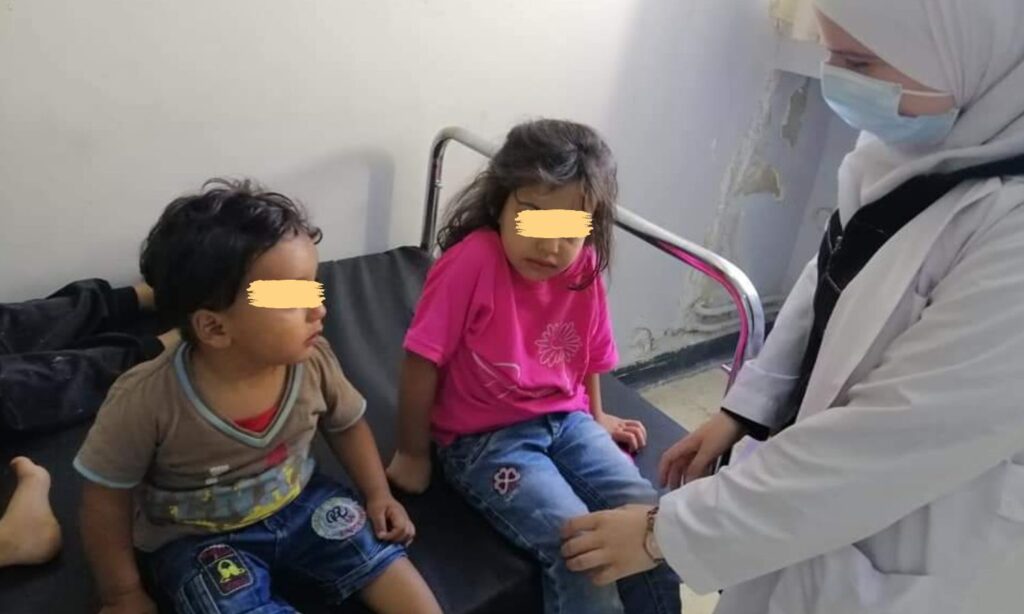Quneitra – Zain al-Joulani
Hassan al-Ghanem was returning from work before sunset in the northern countryside of Quneitra when he was attacked by a stray dog that managed to bite his foot, even though he was riding a motorcycle.
Al-Ghanem’s first reaction after the dog attack was to think about heading to the hospital in search of a rabies vaccine, so he drove his motorcycle to Abaza Hospital in the city of al-Baath, the center of Quneitra governorate.
The rabies vaccine is a fast-acting injection given to prevent viral infection for those who have not received the rabies vaccine, and it is injected near the site of the animal bite if possible, and as soon as possible after the bite.
Al-Ghanem told Enab Baladi that a nurse received him at the emergency department entrance, began disinfecting the wound, and washing it with water and soap, informing him that his injury did not require any medication as the bite was superficial.
After a long argument with the nurse, al-Ghanem sought a connection in the hospital to secure the rabies antidote, fearing complications from the bite he sustained.
He added, “If I hadn’t found a connection (a relative) in the hospital, I would not have been able to get the rabies vaccine.”
Dr. Hassan Zitoun at Abaza Hospital told Enab Baladi that all dog bite cases are received by the hospital around the clock.
He added that treating dog bites occurs in three phases, starting from the first day after the bite and extending over three months, where the patient is given two doses of the rabies vaccine on the first day, followed by a second dose after seven days.
After 21 days from the beginning of the treatment, the injured person receives a third dose of the vaccine in the deltoid muscle of the arm, and then the dose is repeated three months after starting treatment.
The doctor noted that the vaccine is given only in specific cases during the first visit, and the administration of the vaccine can be bypassed in some cases.
Shortage of medicines
Ali Ammar, a 14-year-old boy, was bitten by a dog while accompanying a shepherd in northern Quneitra, which led to a severe injury in the thigh area, requiring his immediate transfer to Abaza Hospital, where the wound was disinfected and washed repeatedly.
The child’s father told Enab Baladi that the nurse and the on-call doctor refused to stitch the wound so that it would not get infected, and they pointed out the necessity of washing and disinfecting it daily.
At the end of the disinfection procedures, the doctor searched for a rabies dose for more than an hour and the child received a dose, but the doctor informed the child’s family that he needed another dose that was not currently available at the hospital and might arrive through the Ministry of Health in the coming period.
Bahaa, a nurse at Abaza Hospital, told Enab Baladi that the provision of the vaccine and serum is done through the Ministry of Health, and if it is not available, patients are referred to the nearest hospital or health center affiliated with the Ministry of Health, which provides medical services.
He added that the procurement of medicine and vaccines is done centrally, and hospitals are not allowed to secure their needs except through the Ministry of Health.
The child’s family called on advisory units and those responsible for combating the phenomenon of stray dogs, which pose a danger to children and families, especially at night, and to secure the necessary medication at Abaza Hospital and the health centers affiliated with the villages, as some families suffer from the difficulty of traveling between towns and villages in the governorate, according to their statement.
Lack of medical services
Mamdouh Abaza Hospital is the only government hospital in the city of al-Baath in Quneitra governorate, southern Syria. It was built after the residents of the province suffered from the lack of medical services in the area since 1967, after the destruction of the Golan Hospital in Quneitra city.
Residents of the area resort to treatment at the hospital, amidst repeated complaints about poor services, lack of medical staff, absence of oversight, and the state of corruption within it.
Quneitra has been suffering, since the regime forces took control as a result of the settlement agreement in the southern regions under Russian sponsorship in July 2018, from a decline in the health sector, and a near-absence of hospitals and health centers, due to the closure of field hospitals and medical points that the opposition used during the past years.
Additionally, the lack of specialized on-call doctors in their clinics in most parts of Quneitra requires patients to travel distances of up to 50 km, enduring the hardships of travel and standing at military checkpoints to reach the only hospital (Abaza).

